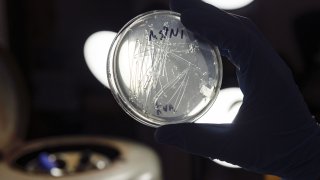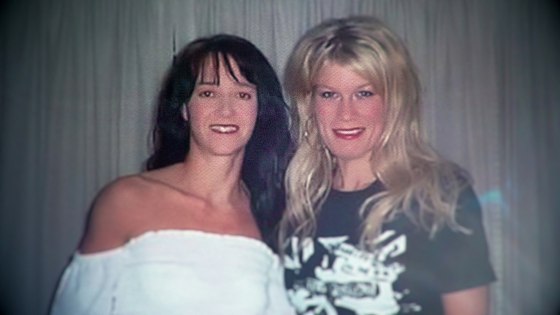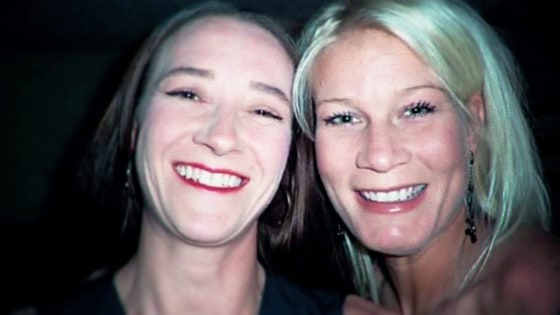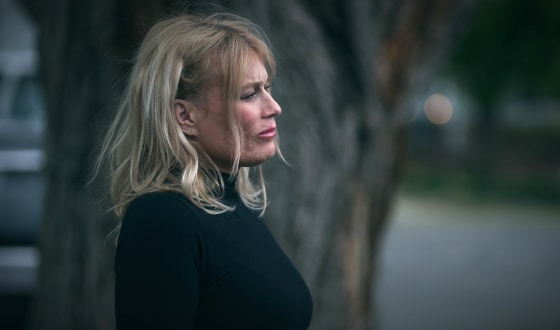
Janie Lynn Ridd and her roommate Rachel had been best friends for 25 years. And then Ridd allegedly tried to poison her with a strain of antibiotic-resistant bacteria.
The case is featured in the first episode of Season 2 of "Worst Roommate Ever" on Netflix, and showed how Ridd's alleged obsession with Rachel's son led her to abuse her capacity as her caretaker.
“I really have a hard time believing that the person I’ve known for 25 years, my best friend and roommate, could do what she did,” Rachel, identified only by her first name, said in the Netflix show. “But it was diabolical, it was evil. It was plotted and planned so perfectly.”

Get top local stories in Southern California delivered to you every morning. >Sign up for NBC LA's News Headlines newsletter.
In the episode, titled "My BFF Tried to Kill Me," Rachel described meeting Ridd in 1995 and later becoming roommates. Rachel worked as a paramedic for six years until she herniated a disc in her back and was no longer able to work.
Ridd was then able to have "100% control" over her when she became pregnant as she was dealing with her back injury, Rachel said in the show.
After Rachel gave birth to her son, Ryder, friends described Ridd as becoming a second mother to help care for Ryder. And as Rachel pursued medical treatment for her back, she said she mysteriously becoming sicker and sicker.
U.S. & World
News from around the country and around the globe
“She found joy in tormenting me,” Rachel said. “I don’t think I was human to her.”
Keep reading for the true story of how Ridd obtained antibiotic-resistant bacteria, as shown in the first episode of the latest season of "Worst Roommate Ever."

How did Janie Ridd purchase VRSA, and what is it?
Authorities began investigating Ridd when she contacted a dark web vendor selling Vancomycin-resistant Staphylococcus aureus (VRSA) in October 2019, according to an indictment filed in Utah's 3rd District court.
According to the Centers for Disease Control and Prevention, VRSA is a strain of the staph bacteria that can cause infections that look like everything from skin conditions to severe wound infections. VRSA is resistant to most antibiotics and infections can lead to death.
Ridd communicated with a dark web vendor from October to December 2019, according to the indictment. She told the vendor she was a biology teacher and needed VRSA cultures for a science experiment at the school.
Ridd was actually employed at a job assistance center for Native Americans in West Valley City, Utah, the indictment said.
When the vendor said VRSA could be obtained through more legitimate sources for scientific research, Ridd offered to pay for overnight shipping to receive the cultures faster, the indictment said.
On Dec. 12, 2019, Ridd purchased the VRSA cultures from the vendor for $300 in Bitcoin, according to the indictment.
Who was Janie Ridd's intended victim?

Authorities wrote in the indictment that Ridd lived with two other people — her roommate and her son, a minor.
Officials did not name the roommate in the indictment. But they identified the roommate as having multiple health issues in the past, including back surgeries and a severe hypoglycemic incident, which Rachel discussed experiencing in "Worst Roommate Ever."
Ridd was also identified in the indictment as the roommate's caretaker, and as having control of her finances and personal documents, which Rachel corroborated in the documentary.
The indictment cited police reports showing that Ridd and her roommate had "a hostile relationship that resulted in (Ridd) filing for and receiving an ex-parte protective order and temporary custody of Roommate's minor son."
In "Worst Roommate Ever," Rachel confirmed the order was lifted three days later and she was returned custody of her son.
Records noted that Ridd and Rachel's relationship "deteriorated over the years due to mutually-claimed power issues and control-type domestic violence dynamics," the indictment stated.
How did authorities catch Janie Ridd?
FBI agents delivered a package to Ridd's mailbox containing petri dishes containing fake VRSA, which were concealed in a plastic Folgers Coffee container in coffee grounds, according to the indictment and interviews with two FBI agents in the Netflix show.
On Dec. 17, 2019, agents watched Ridd pick up the package and then drive to work, where a special agent made contact with her to interview her about the package, according to the indictment.
Ridd first told the agent she had purchased expensive coffee from an online company for $300, according to the indictment. She later admitted to lying about the coffee, and said she had purchased a "biological" from the dark web to make beer in her basement.
She then "walked back her statement" and said she had ordered a form of staph for "experimental purposes and to satisfy a personal curiosity she had stemming from her roommate's recent exposure to MRSA," according to the indictment.
"Eventually, (Ridd) admitted to purchasing the VRSA from a Dark Web marketplace as well as other items with the intention of simply conducting simple experiments," the indictment stated.
During the interview, Ridd told the agent she and her roommate had been friends for 25 years, and that her roommate had authored a will that would give Ridd custody of her son in the event of her death, according to the indictment.
In October 2019, Ridd became “upset” when her roommate discussed changing the will to have her niece become the legal custodian of her son, according to the indictment.
Ridd also told the agent she had a life insurance policy on herself and her roommate, with each being each other's beneficiary, according to the indictment.
During the interview, a FBI agent asked Ridd if it had ever crossed her mind to use the biological agent on Rachel.
"No, and I wouldn't even know how to do that," Ridd said, according to a tape of the interview aired during the show. "No, she's my best friend and whether we argue or not, she's been my best friend for 25 years and I love her like a sister."
At the end of the interview, Ridd was arrested, the agents and indictment stated.
Authorities interviewed Ridd's roommate following her arrest, who told investigators she had been friends with Ridd for 25 years, according to the indictment.
Ridd's roommate told investigators she was sick and recovering from different surgeries, according to the indictment. After one of her surgeries in March 2019, "a suspicious MRSA infection was discovered on the wound," according to the indictment.
In June 2019, Ridd's roommate said she had two separate episodes of dangerous blood sugar levels which required her to be hospitalized, though she was not diabetic and did not take insulin.
Ridd's roommate recalled having a conversation while watching a true-crime show where Ridd told her she thought the best way to kill someone and get away with it would be to inject the victim with insulin, according to the indictment.
Authorities subsequently searched Ridd's account on the dark web marketplace and found a purchase of insulin in September 2019, according to the indictment.
Ridd's roommate had another surgery in October 2019, and "inexplicably developed three golf-ball sized infections on the wound," the indictment stated. One of the infections was tested and was determined to contain E. coli, a type of bacteria.
The roommate's surgeon told investigators that the E. coli infection "did not come as a result of surgery and must have been injected," according to the indictment.
Investigators served a search warrant at Ridd's home and located hypodermic needles that were not owned by the roommate, along with a copy of a living will that had gone missing from the safe, according to the indictment.
"She didn’t ruin my life," Rachel said in the documentary. "She ruined hers, and that’s sad. That’s very sad."
What was Janie Ridd's sentence?
After Ridd's arrest, she was charged with three felonies: aggravated intentional abuse of a disabled or elder adult, attempted intentional abuse of a disabled or elder adult, and attempted possession of a weapon of mass destruction, according to court documents.
Ridd pleaded guilty to attempted intentional abuse of a disabled or elder adult and attempted possession of a weapon of mass destruction on Aug. 25, 2020, according to court documents. The third charge was dismissed as part of her plea deal with prosecutors, Utah's Deseret News reported.
Ridd was sentenced to a prison term of up to five years for attempted intentional abuse of a disabled or elder adult, and sentenced to one to 15 years for attempted possession of a weapon of mass destruction, according to court documents.
Following Ridd's sentencing, her attorney Scott Williams issued a statement to Utah's ABC4: "When a person does as Ms. Ridd did, and accepts responsibility and pleads guilty without having any hearings or a full description of the totality of a case, the only thing the public hears is one side–unchallenged. Despite a sentencing matrix of probation, she agreed to go to prison, and we have put our faith in the Board of Pardons to consider a fair sentence."
The sentences would be served consecutively, according to court documents, and Ridd was also ordered to pay $1,000 plus interest in restitution.
Ridd, now 55, was granted parole and released in January 2022 after serving 25 months in prison, according to the documentary.
In an undated recording of a phone call from the Salt Lake County Jail played during the show, Ridd was heard saying: "I know what's going to happen. I'm going to end up out of here. I'm going to find a way to get him away from her. He needs to come back to me now."
This article first appeared on TODAY.com. More from TODAY:



